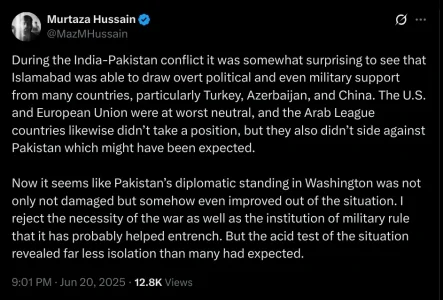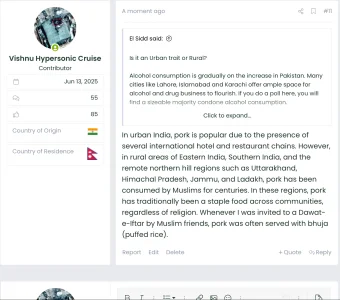- Joined
- Jul 2, 2024
- Messages
- 794
- Likes
- 2,609
Trump Topples Civilian Government in Pakistan
By inviting Pakistan’s General Munir—widely seen as a religious hardliner—to lunch at the White House, President Trump has effectively sidelined Pakistan’s elected civilian government. Though Shehbaz Sharif’s administration was already unpopular in Washington, Trump gave it a final push. The decision had likely been made earlier, but delays followed recent events like the Pahalgam killings and Operation Sindoor.
The soft coup in Pakistan had already begun when Shehbaz became PM. The military, never confident in his ability to tackle Pakistan’s economic crisis—marked by stagflation and ballooning military spending—sought a stronger hand. With help from U.S. Central Command chief Gen. Michael Erik Kurilla, General Munir’s path to Washington was cleared.
Will Munir now sideline Shehbaz Sharif completely?
It seems likely. Trump has reportedly offered trade incentives in exchange for U.S. access to Pakistani military bases—possibly in preparation for action against Iran.
This is the third time in four decades a Pakistani general has received such VIP treatment in Washington. First it was General Zia under Reagan to fight the Soviets, then General Musharraf under Bush during the war on Taliban/Osama Bin Laden. Now it’s General Munir, possibly lining up for a new U.S. conflict—this time with Iran.
The likely outcome: Shehbaz Sharif will be out, military aid will somewhat resume, and U.S.-Pakistan trade will quietly improve. Already a beginning has been made with $450 million to upgrade F-16 fighters and last tranche of $1.2 billion IMF aid.
By inviting Pakistan’s General Munir—widely seen as a religious hardliner—to lunch at the White House, President Trump has effectively sidelined Pakistan’s elected civilian government. Though Shehbaz Sharif’s administration was already unpopular in Washington, Trump gave it a final push. The decision had likely been made earlier, but delays followed recent events like the Pahalgam killings and Operation Sindoor.
The soft coup in Pakistan had already begun when Shehbaz became PM. The military, never confident in his ability to tackle Pakistan’s economic crisis—marked by stagflation and ballooning military spending—sought a stronger hand. With help from U.S. Central Command chief Gen. Michael Erik Kurilla, General Munir’s path to Washington was cleared.
Will Munir now sideline Shehbaz Sharif completely?
It seems likely. Trump has reportedly offered trade incentives in exchange for U.S. access to Pakistani military bases—possibly in preparation for action against Iran.
This is the third time in four decades a Pakistani general has received such VIP treatment in Washington. First it was General Zia under Reagan to fight the Soviets, then General Musharraf under Bush during the war on Taliban/Osama Bin Laden. Now it’s General Munir, possibly lining up for a new U.S. conflict—this time with Iran.
The likely outcome: Shehbaz Sharif will be out, military aid will somewhat resume, and U.S.-Pakistan trade will quietly improve. Already a beginning has been made with $450 million to upgrade F-16 fighters and last tranche of $1.2 billion IMF aid.






